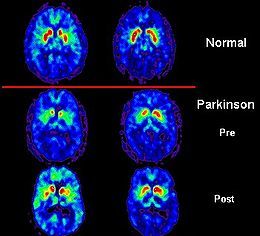At an annual conference last month sponsored by the Michael J. Fox  Foundation, scientists, academics and business representatives gathered in New York City to explore some of the latest and most promising Parkinson’s research that’s being supported by the foundation.
Foundation, scientists, academics and business representatives gathered in New York City to explore some of the latest and most promising Parkinson’s research that’s being supported by the foundation.
23andMe’s Paul Cannon, who manages our Parkinson’s Research Community, was among the more than 250 people gathered to learn more about some of the newest findings meant to help us better understand the biology of the disease as well as potential new targeted therapies.
Below is some of what caught Paul’s attention. The Michael J. Fox Foundation, which has also been a big supporter of 23andMe’s Parkinson’s Research Community, also recently posted a blog about the conference here.
Alpha-Synuclein
One of the interesting new disease modifying drugs is a vaccine that targets a protein called alpha-synuclein. We’ve written in the past about research on alpha-synuclein. This protein is encoded in the SNCA gene and found in the brain. Researchers discovered that these proteins accumulate and clump together in people with Parkinson’s. The thought is that removing these “sticky proteins” could help slow or stop the progression of Parkinson’s.
In an early stage clinical study the vaccine was given to about two-dozen patients. A little more than half of the patients who received the vaccine showed an antibody response. At this stage it’s unclear why some patients responded to the vaccine and others didn’t. Importantly the vaccine appears to be safe and well tolerated and future studies will address the reason for this differential response as well as ask whether the treatment has any effect on the symptoms and progression of Parkinson’s.
DPP-4 Inhibitors
Recently evidence has emerged that certain type of drugs used to treat type 2 diabetes may hold promise for treatment of Parkinson’s patients as well. Encouraging preclinical data were presented for one class of drugs called dipeptidyl protease-4 (DPP-4) inhibitors. It is not known how these drugs might work to affect Parkinson’s, but their use to in diabetics has shown them to be safe which will make it easier to carry out clinical studies in PD.
Levodopa Carbidopa
Whilst disease modifying therapies are understandably of great interest, there is still a lot of room for improvement with current treatments. An example of this is a system designed to deliver a continuous level of a popular drug cocktail used for Parkinson’s patients called levodopa carbidopa.
A liquid form of the drug combo was developed and clinical studies showed that when used with either a pump or a patch it resulted in more consistent levels of the drugs in patients’ blood. This should result in better control of symptoms and it is hoped that it will also decrease the development of uncontrolled movements, known as dyskinesias, associated with long term use of levodopa.
Looking to the Future
These were just some of the highlights from Paul’s notes, but it doesn’t begin to cover the value in bringing together so many researchers working on Parkinson’s.
It also highlights the value of 23andMe’s long time collaboration with the Michael J. Fox Foundation in research. In partnership with our Parkinson’s disease research community we continue to focus on understanding the relationship between the environment and genetic factors in the development of the disease, discovering how and why those with Parkinson’s react differently to existing treatments, as well accelerating the discovery and development of new treatments.



